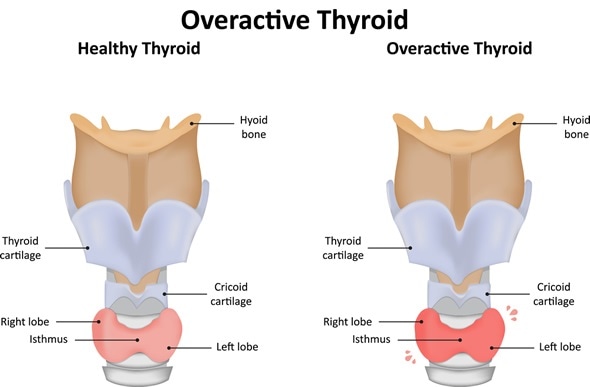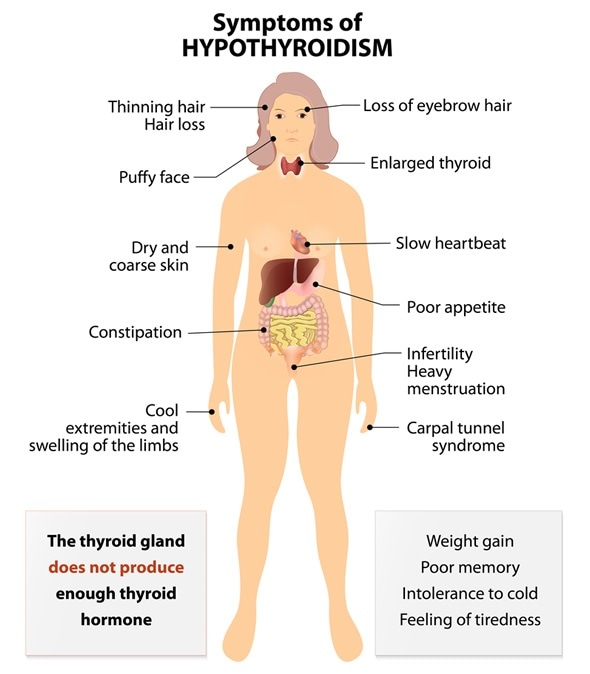Hyperthyroidism, also sometimes referred to as overactive thyroid, is a health condition caused by an excess level of thyroid hormone in the body.
Although any individual may be affected, it is far more common in women than men. Women of childbearing age are the most likely to be affected by hyperthyroidism.

Overactive Thyroid - Image Copyright: joshya / Shutterstock
Causes
The thyroid gland is responsible for the production of the thyroid hormones thyroxine (T4) and triiodothyronine (T3), and their secretion into the blood.
These hormones control a variety of bodily functions such as the heart rate and the blood pressure, as well as energy production from food.
In patients with hyperthyroidism, there is an increased concentration of these hormones in the bloodstream. This may occur as a result of various possible causes, such as:
- Graves’ disease
- Thyroid nodules
- Thyroiditis
- Iodine supplementation
- Amiodarone
- Thyroid cancer
Signs and Symptoms
The rise in thyroid hormones associated with hyperthyroidism can cause an increase in the metabolism of the body, resulting in symptoms such as:
- Heart palpitations
- Nervousness or anxiety
- Hand tremors
- Unexplained weight loss
- Increased appetite
In some cases, the thyroid gland may become enlarged or develop nodules. The enlargement may be visible at the front of the lower neck, a condition known as goiter.

Signs and Symptoms thyroid dysfunction Image Copyright: Designua / Shutterstock
Diagnosis
The diagnosis of hyperthyroidism usually involves a physical examination to investigate for signs of the condition, such as enlargement of the thyroid gland and heart palpitations or an increased heart rate.
The diagnosis can be confirmed with thyroid function tests. These are blood tests to check the concentration of thyroid hormones in the blood.
A patient with hyperthyroidism will usually have high levels of T3 and T4, but low levels of thyroid stimulating hormone (TSH) in the blood.
Other diagnostic tests that may be used include an iodine uptake scan and a thyroid scan. Both of these involve the administration of radioactive iodine and, for this reason, they are often carried out simultaneously.
The iodine uptake scan measures the amount of iodine that is taken up by the thyroid gland, and so detects the state of metabolic activity within the gland.
The thyroid scan, on the other hand, uses gamma ray emissions from the iodine taken up by the gland to create an image of the thyroid.
Treatment
Hyperthyroidism typically responds well to treatment. The majority of patients can be treated effectively, to alleviate the symptoms and control the condition.
There are several different methods that are currently used in practice, including pharmacological management, radioiodine treatment and surgery.
Antithyroid pharmaceutical agents such as carbimazole and methimazole are a common mode of pharmacological treatment.
These medications work by inhibiting the production of thyroid hormones in the thyroid gland, and have a relatively quick effect.
Radioiodine is a second mode of therapy. It is quickly taken up by the thyroid gland because iodine is required to produce the thyroid hormones.
Over a period of several weeks or months, the radioisotope destroys thyroid cells, shrinks the thyroid gland and reduces the production of thyroid hormones. It may produce permanent hypothyroidism.
In some cases, surgery may be required to remove a section or all of the thyroid gland.
This is particularly common for patients with severe goiter. Following surgery, most patients will need thyroid hormone supplements to prevent hypothyroidism.
Along with any of these treatment options, beta-blockers may also be used to manage symptoms of hyperthyroidism.
This group of medications inhibits the effects of thyroid hormones on various organs and systems in the body, without affecting the concentration of the hormones in the blood.
References
Further Reading
Last Updated: Feb 26, 2019